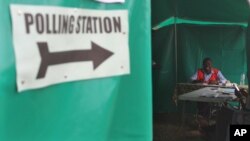The Electoral Commission of Zambia has issued a directive banning the use of cellphones inside polling stations during the August 11 presidential, legislative and local elections.
But some opposition groups have questioned the rationale behind the directive. Parliament member Request Muntanga, of the main opposition United Party for National Development, called it disturbing.
Local media quoted Muntanga as saying, “I want to see where there is a regulation that says no cellphone [in polling stations]. ... The [electoral commission] is already creating uneasiness among players.”
Priscilla Isaac, director of elections at the commission, said the cellphone directive was aimed at ensuring that voters do not undermine the transparency and credibility of the electoral process.
“They would not be allowed to use cellphones inside the polling stations. But if somebody needs to make a call or send a message, they can do so outside the polling station building, because we found that [cellphone use inside] tends to be disruptive,” Isaac said.
“Last year in January, we actually had some voters taking photos of their ballot paper after they had marked it, and they were posting it on social media, which is not permissible because that is equivalent [to] campaigning, and it compromises the secrecy of the ballot,” she said.
Voters' rights
Some civil society and opposition groups said the commission directive infringes on voters' rights, since the constitution guarantees freedom of expression. They also said the commission failed to consult all stakeholders before issuing the directive. They accused the electoral body of doing the bidding of President Edgar Lungu and his governing Patriotic Front party.
“That is not true," Isaac said. “It is just to make sure that we maintain order within the polling stations and not have the secrecy of the vote compromised, and we don’t want disturbances in the polling stations. Can you imagine you are in a polling station and people are voting and everybody is talking on the phone, and tweeting and what have you? It would just become disruptive, and cause discomfort to the voter.”
“People would have to obey," she said. "Once the electoral commission gives a directive of how procedures are within the polling stations, then people would have to comply. And it is not unique to Zambia. In the Seychelles, they are not even allowed to enter a polling station with your phone.”
Critics of the cellphone directive, Isaac said, would be the first to complain and say they were being "disadvantaged" if ballots being circulated on social media were not being cast for their candidates. She also compared the issue to the desire not to have election results announced while voting is still underway "because there is a possibility of it influencing those that are voting. The same can be said about marked ballot papers being posted on social media during the course of voting on election day.”
Meanwhile, civil society and religious groups have also expressed concern about violence before the beginning of the official campaign period, set for May 16. Both the Patriotic Front and the United Party for National Development say their supporters have been attacked by members of the other party.
“The onus is on the political parties to be responsible for the behavior of their supporters and their behaviors as political parties. As a commission, we can’t force them not be violent. But they know the consequences of violence," Isaac said.




